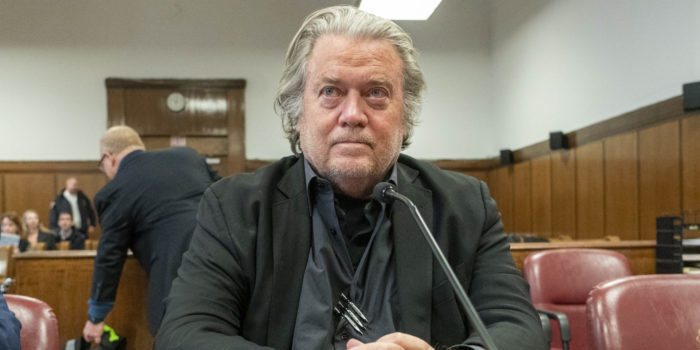(Headline USA) Steve Bannon, a longtime ally of former President Donald Trump, asked the Supreme Court on Friday to delay his prison sentence while he fights his convictions for defying a subpoena from House Democrats’ partisan Jan. 6 Committee.
The emergency application—addressed to Chief Justice John Roberts, who oversees emergency appeals from courts in Washington, D.C.—came after a federal appeals court panel rejected Bannon’s bid to avoid reporting to prison by July 1 to serve his four-month sentence.
Roberts reportedly ordered the Justice Department to respond by Wednesday, offering Bannon the hope that his appeal will at least receive consideration.
Some mildly good news for Bannon.
Chief Justice Roberts has ordered the Biden DOJ to respond to the emergency stay application to keep him out of jail by 4 pm this coming Wednesday, June 26, 2024 at 4 pm.
At that point, Steve’s clock will have ticked down to 4 days left before… pic.twitter.com/MJmXeBcfYw
— Jeff Clark (@JeffClarkUS) June 21, 2024
The court earlier denied a similar request from Trump trade adviser Peter Navarro, who began serving his four-month sentence in March.
U.S. District Judge Carl Nichols, who was nominated to the bench by Trump, earlier this month granted prosecutors’ request to send Bannon to prison after a three-judge panel of the U.S. Court of Appeals for the D.C. Circuit upheld his conviction.
Bannon’s lawyers asked the appeals court to allow him to remain free while he continues to fight the conviction all the way up to the Supreme Court, if necessary. But in a 2-1 vote, the D.C. Circuit panel said Bannon’s case “does not warrant a departure from the general rule” that defendants begin serving their sentence after conviction.
Judges Cornelia Pillard, who was nominated by former President Barack Obama, and Bradley Garcia, a nominee of President Joe Biden, voted to send Bannon to prison. Judge Justin Walker, who was nominated by Trump, dissented, writing that he should not have to serve time before the Supreme Court decides whether to take up his case.
Bannon was convicted nearly two years ago of two counts of contempt of Congress: one for refusing to sit for a deposition with the House Jan. 6 committee and the other for refusing to provide documents related to his involvement in Trump’s efforts to challenge the 2020 election outcome, which Democrats have attempted to use as a political bludgeon against the former president despite having long pursued similar challenges.
Ironically, Attorney General Merrick Garland—who made the decision to prosecute Bannon and Navarro for contempt of Congress—received the very same charges last week but opted not to prosecute himself, claiming he had not committed a crime.
Bannon’s lawyer at trial argued that the former Trump adviser didn’t ignore the subpoena but was still engaged in good-faith negotiations with the congressional committee when he was charged.
The defense has said Bannon had been relying on the advice on his attorney, who believed that Bannon couldn’t testify or produce documents because Trump had invoked executive privilege.
Lawyers for Bannon say the case raises serious legal questions that will likely need to be resolved by the Supreme Court, but he will have already finished his prison sentence by the time the case gets there.
In court papers, Bannon’s lawyers also argued that there is a “strong public interest” in allowing him to remain free in the run-up to the 2024 election because Bannon is a top adviser to Trump’s campaign.
Bannon’s lawyers said the Justice Department, in trying to imprison him now, is “giving an appearance that the government is trying to prevent Mr. Bannon from fully assisting with the campaign and speaking out on important issues, and also ensuring the government exacts its pound of flesh before the possible end of the Biden Administration.”
Prosecutors said in court papers that Bannon’s “role in political discourse” was irrelevant.
“Bannon also cannot reconcile his claim for special treatment with the bedrock principle of equal justice under the law,” prosecutors wrote disingenuously, despite their brazen pursuit of two-tiered justice in the Garland matter and many others. “Even-handed application of the bail statute requires Bannon’s continued detention.”
Navarro, too, has said he couldn’t cooperate with the committee because Trump had invoked executive privilege. The judge barred him from making that argument at trial, however, finding that he didn’t show Trump had actually invoked it.
The Jan. 6 committee’s final report asserted that Trump criminally engaged in a “multi-part conspiracy” to overturn the lawful results of the 2020 election and failed to act to stop his supporters from entering the Capitol.
Since then, however, the 18-month investigation into the former president, stacked with House Speaker Nancy Pelosi’s hand-picked members, has been denounced as deeply partisan and illegitimate.
It was found to have selectively released information while actively concealing other relevant information that undermined its narrative, and to have later tried to withhold the encrypted data—and possibly delete some of it, illegally—when Republicans took control of Congress.
Adapted from reporting by the Associated Press

